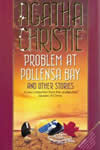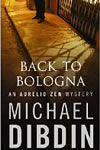« I'm with you in spirit | Main | Worcester »
Saturday February 28, 2009
Books in February
- Problem at Pollensa Bay and other stories by Agatha Christie [read by Jonathan Cecil]
 This is a collection of stories published in the early 1990s but written in the 1920s and early 30s. They are very well read by Jonathan Cecil - a stalwart supporting actor in the UK - but a surprisingly (to me) versatile star at reading these books. I would say that usually he is rather type-cast as gormless Hooray Henries from an earlier era. There is also an audio book read by Hugh Fraser, who is excellent, and I am sure chosen for this task due to his role as Captain Hastings in the 1980s TV adaptations of Poirot.
This is a collection of stories published in the early 1990s but written in the 1920s and early 30s. They are very well read by Jonathan Cecil - a stalwart supporting actor in the UK - but a surprisingly (to me) versatile star at reading these books. I would say that usually he is rather type-cast as gormless Hooray Henries from an earlier era. There is also an audio book read by Hugh Fraser, who is excellent, and I am sure chosen for this task due to his role as Captain Hastings in the 1980s TV adaptations of Poirot.
The stories feature Hercule Poirot, but also some other lesser-known but recurring Christie characters.- Problem at Pollensa Bay - 1935 (Mr Parker Pyne)
- The Second Gong - 1932 (Hercule Poirot, and adapted for TV as Dead Man's Mirror)
- Yellow Iris - 1937 (Hercule Poirot, and and adapted for TV with great knitwear!)
- The Harlequin Tea Set - 1936 (Mr Satterthwaite and Mr Harley Quin)
- The Regatta Mystery - 1939 (Mr Parker Pyne - but revamped from the original 1936 version with Poirot)
- The Love Detectives - 1926 (Mr Satterthwaite and Mr Harley Quin)
- Next To A Dog - 1929
- Magnolia Blossom - 1926
- Saturday by Ian McEwan[read by James Wilby]
 This is a novel that shows how we live today - how some wealthy people live today, of course. But it is clear that even for this well-off brain surgeon, he started life in a small flat with 2 kids on limited income; and, though he and his wife have become successful (and wealthy) in their careers, they have their lovely central town house only through inheritance. Their children are grown to beautiful and talented young people, and the hero knows how lucky he is.
This is a novel that shows how we live today - how some wealthy people live today, of course. But it is clear that even for this well-off brain surgeon, he started life in a small flat with 2 kids on limited income; and, though he and his wife have become successful (and wealthy) in their careers, they have their lovely central town house only through inheritance. Their children are grown to beautiful and talented young people, and the hero knows how lucky he is.
And the reader is constantly aware of how very much there is to lose.
Notable for the fact that the action takes place within 24 hours, some readers seem to think it's a day overly packed with activity. However, to me, it does not seem very out of the ordinary in terms of activities - though I'm not a brain surgeon of course, so that part of it would be extraordinary for me. Basically, he gets up, has breakfast with his son, goes out, sees the anti-war march, has a minor car accident, plays squash, visits his Mother in a care home, collects stuff to eat for dinner, briefly drops in to watch his son rehearse with a band, spends the evening with his family, gets called in to work to do an emergency operation.
That tells you everything and nothing.
It is paced quite slowly - especially noticeable as a talking book- the squash game, for example, is described point by point, and made me glad I had a few lessons when I was about 20 so I could better empathise with what was happening. However, throughout, there is a constant feeling of lurking menace, which made me permanently anxious for the plot to move on. I understand it was born out of the authors own sense of anxiety around potential global threats. The hero explores his general unease with moral dilemmas relating to the concept of war and terrorism - but this is suddenly sharply focussed by a very local threat, which leads to a very real moral dilemma. - Back to Bologna by Michael Dibdin
 I am a real fan of this author and his hero, Italian police inspector Aurelio Zen, even though the books are often suffused with a sense of gloom, despite the humour. I picked up this book by chance, and realised that I have not actually read Dibdin's last couple of books, which is a pleasant surprise for me as there will be no more.
I am a real fan of this author and his hero, Italian police inspector Aurelio Zen, even though the books are often suffused with a sense of gloom, despite the humour. I picked up this book by chance, and realised that I have not actually read Dibdin's last couple of books, which is a pleasant surprise for me as there will be no more.
The book features amusing and topical characters, in the shape of a dead owner of a football team (killed with a Parmesan cheese knife), and a temperamental operatic TV chef. Poignantly, Zen himself is suffering after an operation, and also suffering from hypochondria - and also not doing well in his love life. However, to quote a reviewer, it "delivers both comic and serious insights into the realities of today's Italy".
Posted by Christina at 8:59 PM. Category: Books of the Month
